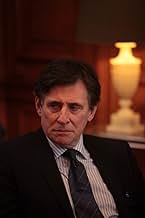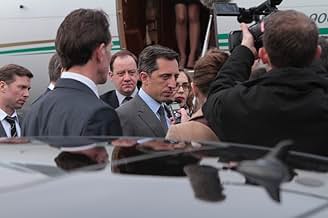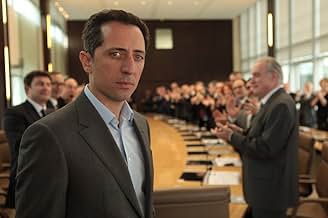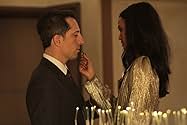IMDb रेटिंग
6.5/10
5.8 हज़ार
आपकी रेटिंग
अपनी भाषा में प्लॉट जोड़ेंThe newly appointed CEO of a giant European investment bank works to hold on to his power when an American hedge fund company tries to buy out his company.The newly appointed CEO of a giant European investment bank works to hold on to his power when an American hedge fund company tries to buy out his company.The newly appointed CEO of a giant European investment bank works to hold on to his power when an American hedge fund company tries to buy out his company.
- पुरस्कार
- 1 जीत और कुल 2 नामांकन
फ़ीचर्ड समीक्षाएं
Basically good, sympathetic, or at least, interesting characters, you can relate to and care for, encounter obstacles, have to struggle for a while, but ultimately find their way through an unfriendly or simply indifferent world. We all love this type of films. "Capital" is emphatically not one of those, but is nevertheless worthy of attention.
There is at least one character, however, who has not lost her moral compass, and still has some, albeit minuscule weight in the film: the wife of the main protagonist, a former economics professor, and now an ambitious CEO of a leading French bank. Her pull on her husband, however, is only marginally stronger than the one that his extended family, of apparently modest means, has on him. He has feelings for her, as well as for his parents, but those simply cannot compare in intensity to the thrill of money. He is a man who understands "the way the world functions", as he is not shy to explain when questioned. It is a game, in which, typically, rich get richer and poor get poorer, but the reverse is not impossible, as we are told, only improbable. He is cool, calculated, unemotional player, consciously going for high stakes. Just like the others, towards him often inimical characters, who he does not blame for their repugnant behaviour, although certainly would not mind occasionally smashing their heads onto hard surfaces nearby. Of course, we understand that he could not have possible been any different and still belong to the top executive branches of the financial world.
Costa Gavras made his name in the genre of international political thriller, picking his subjects to be the most promising themes for such a film at a given time. It is already telling that he chose the world of high finance, and not of politics, as the most relevant field today. Indeed, the main character is addressed always as "the president", and he is treated as such by everybody he meets. He clearly lives in an entirely different world from the majority of even western, relatively well-off humanity, and his decisions, although made explicitly and exclusively for the benefit of the few, indeed affect, thousands of ordinary mortals. The bank that he directs, and pretty much all the interiors he ever dwells in do not fall far behind many European royal palaces. His world is the world of excess, but in his book it should be unapologetically so.
There is a hint in the film of a possible difference between the old European, and the new aggressive, American business attitudes, that may exist only on the surface. American bankers that we meet maybe cannot pronounce Modigliani's name correctly, but they understand perfectly that their French counterparts are just as greedy, and motivated by the same basic predatory impulses, as they are. As the main character says on one occasion, almost defending his adversaries across the Atlantic: "They are just businessman, like us". The difference seems to be only that the French operate from the high-ceiling, well decorated, old world Parisian buildings, whereas their American partners for their machinations prefer flashy yachts and skyscrapers.
The film certainly lacks the depth and the emotion of the very best Gavras' works, such as "Z" or the "Missing", but it functions well at the level of well written, competently shot, and expertly directed financial drama. It is an insightful, if not too original, commentary on today's state of affairs which to many will ring painfully true. There are also some fairly obvious flaws: the parallel thread with the "super model" that the main hero relentlessly pursues is rather stereotypical, and her attitude towards him appears far-fetched. It would have served the story's development better if the relationship with the multi-dimensional French female employee from London's office was introduced earlier and then further developed. This could have added some intellectual and emotional depth to the main character, beyond what was this way left only sketched. These comments notwithstanding, the film presents an entertaining and informative look at the dynamics of the modern world's new nobility.
There is at least one character, however, who has not lost her moral compass, and still has some, albeit minuscule weight in the film: the wife of the main protagonist, a former economics professor, and now an ambitious CEO of a leading French bank. Her pull on her husband, however, is only marginally stronger than the one that his extended family, of apparently modest means, has on him. He has feelings for her, as well as for his parents, but those simply cannot compare in intensity to the thrill of money. He is a man who understands "the way the world functions", as he is not shy to explain when questioned. It is a game, in which, typically, rich get richer and poor get poorer, but the reverse is not impossible, as we are told, only improbable. He is cool, calculated, unemotional player, consciously going for high stakes. Just like the others, towards him often inimical characters, who he does not blame for their repugnant behaviour, although certainly would not mind occasionally smashing their heads onto hard surfaces nearby. Of course, we understand that he could not have possible been any different and still belong to the top executive branches of the financial world.
Costa Gavras made his name in the genre of international political thriller, picking his subjects to be the most promising themes for such a film at a given time. It is already telling that he chose the world of high finance, and not of politics, as the most relevant field today. Indeed, the main character is addressed always as "the president", and he is treated as such by everybody he meets. He clearly lives in an entirely different world from the majority of even western, relatively well-off humanity, and his decisions, although made explicitly and exclusively for the benefit of the few, indeed affect, thousands of ordinary mortals. The bank that he directs, and pretty much all the interiors he ever dwells in do not fall far behind many European royal palaces. His world is the world of excess, but in his book it should be unapologetically so.
There is a hint in the film of a possible difference between the old European, and the new aggressive, American business attitudes, that may exist only on the surface. American bankers that we meet maybe cannot pronounce Modigliani's name correctly, but they understand perfectly that their French counterparts are just as greedy, and motivated by the same basic predatory impulses, as they are. As the main character says on one occasion, almost defending his adversaries across the Atlantic: "They are just businessman, like us". The difference seems to be only that the French operate from the high-ceiling, well decorated, old world Parisian buildings, whereas their American partners for their machinations prefer flashy yachts and skyscrapers.
The film certainly lacks the depth and the emotion of the very best Gavras' works, such as "Z" or the "Missing", but it functions well at the level of well written, competently shot, and expertly directed financial drama. It is an insightful, if not too original, commentary on today's state of affairs which to many will ring painfully true. There are also some fairly obvious flaws: the parallel thread with the "super model" that the main hero relentlessly pursues is rather stereotypical, and her attitude towards him appears far-fetched. It would have served the story's development better if the relationship with the multi-dimensional French female employee from London's office was introduced earlier and then further developed. This could have added some intellectual and emotional depth to the main character, beyond what was this way left only sketched. These comments notwithstanding, the film presents an entertaining and informative look at the dynamics of the modern world's new nobility.
Very interested 2012 French film by Costa Garvas. Shows how a large French bank operates in the world's financial market and how it integrates into the international banking system. An aging CEO is replaced by a younger executive. He finds himself with a lot of internal and external pressures. Some scenes of it reminds of Wall Street 2. A different approach to the financial market at a fast pace, in some moments too fast to follow and grasp. Also shows the relationships between the different executives and its lower level employees when the new CEO starts laying off people to tune up the finances of the bank with ruthless practices and little concern about employees needs and their respect. Worth while seeing.
Le Capital follows the course of a newly-appointed CEO of a hypothetical major French bank with global reach. The protagonist is a smart, ambitious and hard-nosed executive, but the constant pressures he faces at the helm of Phenix Bank from his board, which didn't favor his taking command but feel they can control him, from his employees who are unclear as to the direction in which he wants to take Phenix Bank compared to his cancer-stricken predecessor, and most keenly from his shareholders, particularly a U.S.-located hedge fund, almost want to make you sympathize with him. But his ruthless, hard character and the cold but correct way he treats his family ultimately prevents this identification. (I've read that the actor portraying the CEO is a comedian on French television so this must be quite a switch for him.)
The heart of the film is the pressure that the American hedge fund, as represented by a character who would put Gordon Ghecko to shame, places on the CEO to initiate drastic actions to pump the stock price. Apparently, the hedge fund has acquired a dominant position in Phenix's stock that enables it to virtually dictate policy to the bank, or at least to this CEO. Of course the dictation is smoothed by the fact that he's promised huge bonuses to implement these "suggestions". The initial directive is to fire 10,000 of the bank's employees which he does gratified by the promised bonus and seemingly unconcerned by the fact that "his" bank does not appear to have an excess labor force. The final "directive" is for Phenix Bank to make an acquisition of a troubled Japanese bank with poor assets. At last some resistance begins to form in our CEO because he senses he'll be the "fall guy" for such an ill-advised acquisition and that the adverse impact of such an acquisition on Phenix's stock price would apparently enable the hedge fund to acquire complete control of the bank at a cheaper price. (One could nitpick and say that the filmmakers in their anti-capitalist bias are confusing corporate raiders who do hostile takeovers with hedge funds who are content to be "activist" investors and prod the company's management and not manage the company. Moreover, why would the hedge fund want to manage the troubled assets of the Japanese bank as part of the larger Phenix Bank, particularly if they were acquired with cash most likely burdening Phenix Bank with much increased debt? A stock-for-stock exchange might affect the target bank's shareholders with a lower value for their stock.) What the CEO ultimately does about the Japanese bank and his erstwhile hedge fund friends I'll leave for those who choose to view this film. I, for one, enjoyed it. I found the banking scenes to be interesting and the characterizations to be provocative although in some cases over the top. For non-French speakers like this English speaker, I think you'll need to go back a bit a number of times on a DVD to refresh the sub-titles in order to follow the financial ramifications of the plot.
The filmmakers' attitude toward high-finance capitalism is most apparent in an amusing but over-the-top scene where our banking CEO says in an opulent boardroom among well-dressed board members that our new paradigm is to "rob from the poor and give to the rich" to which he's met with enthusiastic applause. I'm sure the vast majority of bankers don't believe this or follow this goal explicitly; however, their actions may sometimes indeed perform this transfer of wealth, e.g., the LIBOR interest rate manipulation which served to enrich banks and their usually wealthy shareholders (but also including 401k holders) but increased the cost to homeowners with variable-rate mortgages. I would guess the basic question underlying films like "Capital" is whether economic systems like capitalism promote the kind of greed and exploitation we see in "Capital" or whether greed-filled and exploitative people perform their misery in any kind of system (for you socialists out there, socialism did not really end greed and exploitation; it was just manifested in another form, the form of political power and perks). Perhaps the filmmakers' message is that financial capitalism allows monetary greed to be more fully realized.
The heart of the film is the pressure that the American hedge fund, as represented by a character who would put Gordon Ghecko to shame, places on the CEO to initiate drastic actions to pump the stock price. Apparently, the hedge fund has acquired a dominant position in Phenix's stock that enables it to virtually dictate policy to the bank, or at least to this CEO. Of course the dictation is smoothed by the fact that he's promised huge bonuses to implement these "suggestions". The initial directive is to fire 10,000 of the bank's employees which he does gratified by the promised bonus and seemingly unconcerned by the fact that "his" bank does not appear to have an excess labor force. The final "directive" is for Phenix Bank to make an acquisition of a troubled Japanese bank with poor assets. At last some resistance begins to form in our CEO because he senses he'll be the "fall guy" for such an ill-advised acquisition and that the adverse impact of such an acquisition on Phenix's stock price would apparently enable the hedge fund to acquire complete control of the bank at a cheaper price. (One could nitpick and say that the filmmakers in their anti-capitalist bias are confusing corporate raiders who do hostile takeovers with hedge funds who are content to be "activist" investors and prod the company's management and not manage the company. Moreover, why would the hedge fund want to manage the troubled assets of the Japanese bank as part of the larger Phenix Bank, particularly if they were acquired with cash most likely burdening Phenix Bank with much increased debt? A stock-for-stock exchange might affect the target bank's shareholders with a lower value for their stock.) What the CEO ultimately does about the Japanese bank and his erstwhile hedge fund friends I'll leave for those who choose to view this film. I, for one, enjoyed it. I found the banking scenes to be interesting and the characterizations to be provocative although in some cases over the top. For non-French speakers like this English speaker, I think you'll need to go back a bit a number of times on a DVD to refresh the sub-titles in order to follow the financial ramifications of the plot.
The filmmakers' attitude toward high-finance capitalism is most apparent in an amusing but over-the-top scene where our banking CEO says in an opulent boardroom among well-dressed board members that our new paradigm is to "rob from the poor and give to the rich" to which he's met with enthusiastic applause. I'm sure the vast majority of bankers don't believe this or follow this goal explicitly; however, their actions may sometimes indeed perform this transfer of wealth, e.g., the LIBOR interest rate manipulation which served to enrich banks and their usually wealthy shareholders (but also including 401k holders) but increased the cost to homeowners with variable-rate mortgages. I would guess the basic question underlying films like "Capital" is whether economic systems like capitalism promote the kind of greed and exploitation we see in "Capital" or whether greed-filled and exploitative people perform their misery in any kind of system (for you socialists out there, socialism did not really end greed and exploitation; it was just manifested in another form, the form of political power and perks). Perhaps the filmmakers' message is that financial capitalism allows monetary greed to be more fully realized.
Let's continue to rob the poor and make the rich richer!" this is what about the modern day banking and financing (undre)world, banks are just like Mafia, bankers Mafiosos, banks' CEO in private jet doing country hopping, hiring retired cop to do the dirt-digging and trashcan/dumpster diving jobs, committing some adultery flirting with high priced model- hooker, back-stabbing while self defense, behind the door deals, estranged to parents, wives, kids, fence off hostile takeover, firing the employees as many as possible, no gender and age are safe, laying off more, the stockholders will be happier and the stock will be rocketing. so, indeed "money is not a tool but a master, serving him well and he'll reward you generously". so let's continue to rob the poor blind and serve the rich loyally. what a great movie, very tense and thrilling, great montage, lot of exotic locations in different countries. this is a very nicely done movie, quite worth watching.
If there is one message that the movie is trying to communicate to its audience it's the above title.
There are of course reviews that point out the alleged likeliness of this film with movies like "Wall Street" usually concluding "that there is nothing new to see". Under closer examination however, any similarities between the two films go only skin-deep and can only be considered superficial. There are fundamental differences between these two movies because they represent two different approaches and evaluations of the same issue and which one hits home is up for you to decide. And thats because "Wall Street" focuses on the seducing power and aloofness of a loan shark that acts as a money fueled lone wolf, as opposed to the naiveness of a young rookie which is slow to disillusion himself about his own actions while he's getting carried away (but eventually comes out on top etc). The caveat of such scenarios is in that they constantly, silently and almost purposefully marginalize the inherent, all consuming, self-perpetuating environment and ill-conceived culture that money in and all by itself creates, even for "the winners of the game".
La Capital on the other hand has none of the above shortcomings when it comes to describing the black hole lurking deep into the very foundations of our culture: Money. It's a film about attitudes and value systems across the board, with a scenario that's free of cliché good-guy-vs-bad-guy dualities and with the courageous nerve to "pull no punches" sparing its viewer from having to suffer another stereotypical "happy ending" made-in-Hollywood (has elements of it but still its not "right into your face").
Finally, I would just like to add that, all in all, Mr Gavras is right in that there will come a time in the not so distant future ... A time in which, among other things, our western culture will look back to the contemporary intellectuals and artists to examine which ones did of their duty in terms of articulating the public opinion, bringing the spotlight on the machinations of the financial system and the corrosive effects that money in and all by itself has both on our societies as a whole, in our own micro-worlds and those of our acquaintances as well as our own fragile, individual psyches. And when this time comes I think that the memory of both Mr Gavras and those that stood by him in this and similar projects will be, if not exalted, then at the very least spared from the outrage of the dystopian poverty-striken masses.
There are of course reviews that point out the alleged likeliness of this film with movies like "Wall Street" usually concluding "that there is nothing new to see". Under closer examination however, any similarities between the two films go only skin-deep and can only be considered superficial. There are fundamental differences between these two movies because they represent two different approaches and evaluations of the same issue and which one hits home is up for you to decide. And thats because "Wall Street" focuses on the seducing power and aloofness of a loan shark that acts as a money fueled lone wolf, as opposed to the naiveness of a young rookie which is slow to disillusion himself about his own actions while he's getting carried away (but eventually comes out on top etc). The caveat of such scenarios is in that they constantly, silently and almost purposefully marginalize the inherent, all consuming, self-perpetuating environment and ill-conceived culture that money in and all by itself creates, even for "the winners of the game".
La Capital on the other hand has none of the above shortcomings when it comes to describing the black hole lurking deep into the very foundations of our culture: Money. It's a film about attitudes and value systems across the board, with a scenario that's free of cliché good-guy-vs-bad-guy dualities and with the courageous nerve to "pull no punches" sparing its viewer from having to suffer another stereotypical "happy ending" made-in-Hollywood (has elements of it but still its not "right into your face").
Finally, I would just like to add that, all in all, Mr Gavras is right in that there will come a time in the not so distant future ... A time in which, among other things, our western culture will look back to the contemporary intellectuals and artists to examine which ones did of their duty in terms of articulating the public opinion, bringing the spotlight on the machinations of the financial system and the corrosive effects that money in and all by itself has both on our societies as a whole, in our own micro-worlds and those of our acquaintances as well as our own fragile, individual psyches. And when this time comes I think that the memory of both Mr Gavras and those that stood by him in this and similar projects will be, if not exalted, then at the very least spared from the outrage of the dystopian poverty-striken masses.
क्या आपको पता है
- गूफ़In a dinner scene towards 67 minutes into the film, the liquid level in a bottle in front of Marc Tourneuil keep on changing between shots.
- भाव
L'oncle Bruno: Your bank makes money and you lay people off. How do you cope?
टॉप पसंद
रेटिंग देने के लिए साइन-इन करें और वैयक्तिकृत सुझावों के लिए वॉचलिस्ट करें
- How long is Capital?Alexa द्वारा संचालित
विवरण
बॉक्स ऑफ़िस
- US और कनाडा में सकल
- $1,01,700
- US और कनाडा में पहले सप्ताह में कुल कमाई
- $22,400
- 27 अक्टू॰ 2013
- दुनिया भर में सकल
- $48,22,849
- चलने की अवधि1 घंटा 54 मिनट
- रंग
- ध्वनि मिश्रण
- पक्ष अनुपात
- 2.35 : 1
इस पेज में योगदान दें
किसी बदलाव का सुझाव दें या अनुपलब्ध कॉन्टेंट जोड़ें























